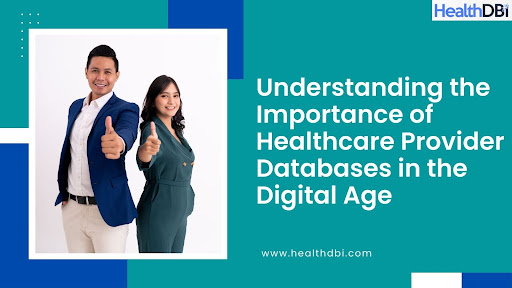Understanding the Importance of Healthcare Provider Databases in the Digital Age


Claim Your 7 days Free Trail Now!!!
Introduction
In today’s digital age, healthcare organisations increasingly rely on data-driven strategies to enhance patient care, improve operational efficiency, and make informed decisions. Central to this is the utilisation of healthcare provider databases. These comprehensive repositories of healthcare data provide organisations with valuable insights and contacts of healthcare professionals. In this blog post, we will explore the importance of healthcare provider databases, their role in the digital age, and their benefits to the healthcare industry. So, let’s dive into healthcare provider databases and understand their significance in the modern healthcare landscape.
The Role of Healthcare Provider Databases
Healthcare provider databases are robust repositories that store many healthcare professionals, institutions, and patient care data. These databases include comprehensive healthcare data lists physicians, doctors, nurses, and more. The primary role of healthcare provider databases is to provide accurate and up-to-date information that facilitates efficient healthcare operations, targeted marketing, and improved patient outcomes. These databases serve as valuable resources for healthcare organisations, offering insights into healthcare professionals’ specialties, contact details, affiliations, and geographical locations.
Leveraging Healthcare Provider Databases for Operational Excellence
Efficient Staffing and Recruitment: Healthcare provider databases enable organisations to identify and recruit qualified professionals based on specific criteria such as specialisation, experience, and location. This streamlines the staffing process, improves workforce management, and enhances the quality of care delivered.
Targeted Marketing and Outreach: Healthcare provider databases offer valuable insights into healthcare professionals’ specialties and locations, enabling organisations to target their marketing efforts effectively. This allows for personalised and relevant communication, leading to better engagement and response rates.
Streamlined Referral Networks: Access to healthcare provider databases allows organisations to establish and expand referral networks based on healthcare professionals data plans specialties and areas of expertise. This fosters collaboration, improves care coordination, and enhances patient outcomes.
Enhancing Patient Care and Outcomes
Care Continuity and Coordination: Healthcare provider databases facilitate care continuity and coordination by seamlessly sharing patient information among healthcare professionals. This ensures patients receive holistic and well-coordinated care across different providers and settings.
Personalised Treatment Plans: With comprehensive healthcare provider data access, organisations can develop personalised treatment plans based on a patient’s unique needs and preferences. This enhances patient satisfaction, adherence to treatment, and overall health outcomes.
Health Analytics and Research: Healthcare provider databases serve as valuable data sources for health analytics and research. They enable organisations to continuously identify trends, analyse outcomes, and drive evidence-based decision-making to improve healthcare practices.
Ensuring Data Quality and Compliance
To leverage healthcare provider databases effectively, data quality and compliance are paramount. Organisations must ensure that the databases they utilise are sourced from reputable healthcare data companies that prioritise data accuracy, privacy, and regulatory compliance. Adhering to industry standards and regulations, such as HIPAA, safeguards patient privacy and protects sensitive healthcare information.
Conclusion
In the digital age, healthcare provider databases drive operational excellence, targeted marketing, and improved patient care. Leveraging comprehensive healthcare data lists, these databases enable organisations to make informed decisions, enhance patient outcomes, and successfully navigate the complexities of the modern healthcare landscape.
FAQ
Share this :
Categories
Claim Your 7 days Free Trail Now!!!
Latest blog & articles
Urologists Mailing List – Top Healthcare Leads
Blog October 3, 2023 Urologists Mailing List – Top Healthcare Leads Claim Your...
How To Find Doctor’s Email Addresses At Affordable Price (2023)
Blog October 3, 2023 How To Find Doctor’s Email Addresses At Affordable Price...
Medical Email Lists For Healthcare Marketing
Blog October 3, 2023 Medical Email Lists For Healthcare Marketing Claim Your 7...



